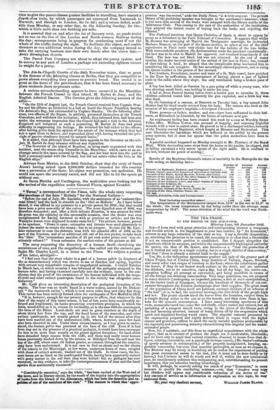THE TEA-TRADE.
TO THE EDITOR OF THE SPECTATOR.
Mincing Lane, 9th December 1846. Sea—I have read with great attention and corresponding interest a temperate clear and forcible article in the Supplement to your last number, b " An Economist,". adverse to any large reduction of the duty on tea. I say a orate disquisition;' kW, admitting the premises to be sound, the reasoning is so ear that a formidable. if not an unanswerable position is established. But. I dispute altogether the hypothesis which he assumes, and which the unquestionably high logical authority' he quotes, viz, that of Mr. Senior, also favours—i. e. "that the production of tea is limited not only to a single country, but to a single district of that country," and that "there is already a natural limit to the supply." Tea' Sir, is the indigenous spontaneous product not only of the greater part of China Proper, but of Cochin China, large districts of Tartary, Japan, Burmah,, and-many other vast ranges of territory in the East; where the inhabitants gather the leaves, if they do not bestow much culture on the shrub, and are universal, tea-drinkers, not as we ourselves, once a day, but all day long; the native con- sumption baffling all attempt at calculation, and being multifold in excess of all the foreign tea-drinking communities. Very large quantities, too, are prepared in many districts (undergoing an imperfect process, a sort of senlismanipulation,) for the barter trade at Singapore, whence the hundreds of thousands of tea-con- sumers throughout the Eastern Archipelago draw their supplies. The great mass of the population of China itself are habitual, constant drinkers of an Infusion of "the leaf"; it is, in fact, the universal beverage, the diet-drink of the people high and low. The poorer classes shred the leaves from the branches, subject them to a simple drying either in the sun or on the hearth, and then store them in bas- kets for the season's consumption. I have many interesting specimens of this rude, unmanufactured tea; some flat and chaffy, others curled and twisted, but all partaking of a pungent rancid taste, owing to the juices of the fibrous part of the leaf becoming absorbed, instead of being driven off by the evaporation which quick and regulated heating would cause. The singular contrast presented by the expensively prepared and highly delicate kinds in vogue with the higher classes and grendees, suffices to show the easily variable qualities produceable by the ingenuity and persevering industry characterizing this singular and far under- estimated people. Now, Sir, I maintain, and this from no superficial acquaintance with the whole subject, that as to amount of product the staple tea is incalculable, illimitable; and we have only to apply that natural stimulus, demand, to insure froin that di- ligent, untiring community, not a quadruple increase merely, (Mr. Senior's estimate qf speedy advance in consumption,) of the properly manipulated, keeping, ex- portable commodity, but even that quantity quintupled, 08 soon as we require it, The Minister may do wisely in hesitating ere he makes the experiment of putting this great cotnmercial axiom to the test, (for it must not be done feebly or by halves) but I believe he will do wisely and well if, within the new commercial year, he considerately unfettera this reorganizing, and notwithstanding its present Importance, this yet infantine trading interchange. It will, perhaps, be scarcely asking too much of your "Economist," in some measure to qualify his concluding sentence,—viz. that "traders may urge but thinkers will oppose any considerable reduction of the duties on tea." Any amount of service u to information or explanation on this topic, he may command from,


























 Previous page
Previous page